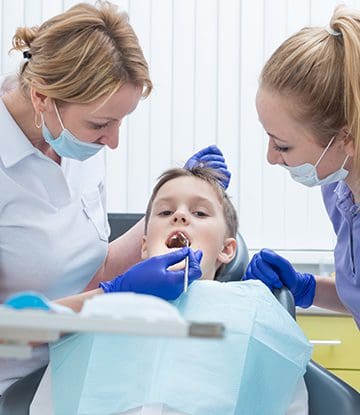Tooth Trauma
Tooth Trauma
Your child fell on the playground and knocked out a tooth? What do you do?
Trauma to the oral region is very common, being 5% of all injuries. In preschool 18% of children’s injuries occur in the oral region.
Why are children so prone to oral injuries?
The majority of oral injuries occur in boys 2-4 years and 9-10 years, in girls 2-3 years.
At the ages of 2 and 3 motor coordination is developing. In addition, children at the younger ages are much more active such as playing sports and climbing play structures. The oral injuries typically occur due to falls, collisions or contacts with hard surfaces.

What to do if your child knocks out his/her tooth?
- Stay calm. Chipping a tooth can generally be fixed by a dentist and is a very common occurrence.
- Check for signs of pain. If the child is younger and it is a baby tooth the child may not realize what has happened. If the child is older and it is an adult tooth it could be very painful.
- Contact your child’s dentist immediately. The dentist can make specific recommendations according to your child’s dental history.
- Rinse your child’s mouth with water.
- Control bleeding (if applicable). To help control the bleeding, place a piece of sterile gauze over the tooth socket and have the child bite down to help minimize bleeding.
- Put a cold compress on the face to help reduce swelling. Over the counter pain relievers can also help relieve the pain.
- If possible, find and bring tooth or tooth fragment to the dentist. If a permanent tooth is lost, you want to try your best to replace the knocked out tooth as quickly as possible. The permanent tooth has the best chance of survival if replaced within five minutes of losing it. If unable to replace it, put the tooth in milk to preserve it on the way to the dentist. Even if you are able to replace the tooth, seek dental care immediately.
If a baby tooth is knocked out:
- Do not try and replant a child’s baby tooth. Forcing a lost baby tooth into the gum can cause damage to the permanent teeth beneath the tooth.
- Visit the dentist as soon as possible. A child’s knocked out baby tooth is a terrible situation however it is usually not as severe as knocking out a permanent tooth. Yes, your child will eventually lose that tooth to make way for the permanent tooth however losing the baby tooth too early can lead to other teeth crowding into the vacant spot. To prevent this dentists sometimes insert a space maintainer to keep the area open prior to the permanent tooth growing in.
If a permanent tooth is knocked out and you have the tooth:
- Avoid touching the root of the tooth. Hold the tooth by the crown (widest part). If the tooth is found and is too dirty to replace directly in empty socket, rinse it in milk or plain water. Make sure to plug the drain before doing so to avoid losing the tooth down the drain.
- Do not scrub the tooth or remove any pieces of tissue.
- If replacing the tooth is not possible, put the tooth in a clean container with milk, saltwater or saliva.
- Do not allow the tooth to dry. Wrapping the tooth in a napkin or allowing it to dry greatly reduces the chances that it will reattach.
- Visit the dentist as soon as possible. Make sure to bring the tooth with you.
If a permanent tooth is knocked out and you cannot find the tooth:
- Visit the dentist as soon as possible. The tooth may be stuck in your child’s mouth and the dentist can take X-rays to look for it.
The permanent tooth is lost or will not reattach.
- When a permanent tooth is unable to be re-attached to the gums your dentist will provide you with some options. The most common option to fill the gap is an implant that is inserted into the jawbone. Once the implant is inserted, it will take around 3 months to grow together with the bone.
- An implant requires the same care as natural teeth. Flossing, brushing and regular dental check-ups are just as important.
Some ways to prevent tooth related injuries in children:
- Have your child wear a mouthguard during sports.
- Avoid biting down on hard food, candies and ice.